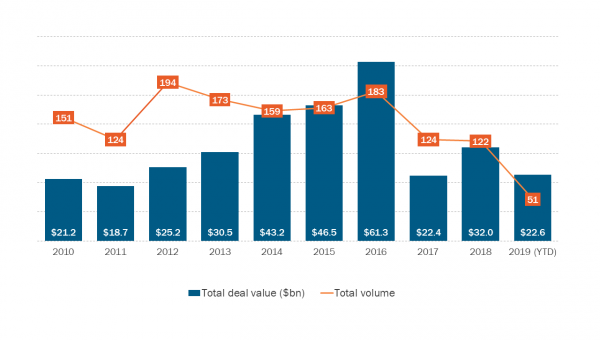by Scott Denne
A string of notable divestitures in recent weeks gives the impression that shedding business units has become more popular among large tech vendors. Instead, the opposite is true. Public companies are finding new homes for old assets at a historically low pace amid a rising stock market and rosy sales outlook.
Since the start of the month, there have been three high-profile divestitures:
Square shed its food delivery business, Caviar, in a sale to DoorDash that returned nearly 10x what the mobile point-of-sale provider paid for the business five years earlier.
Symantec sold its enterprise security business, nearly half of its revenue, for $10.7bn to Broadcom in the largest information security deal in history. (Subscribers to 451 Research’s Market Insight service can access a full report on that deal here.)
Most recently, Verizon unwound Yahoo’s $1bn acquisition of Tumblr, selling the business to Automattic, reportedly for a token amount of cash.
While such exits make headlines, they’re not part of a surge in divestitures. According to 451 Research‘s M&A KnowledgeBase, companies that trade on the two major US exchanges have sold just 51 business units since the start of the year, meaning that 2019 could be the first year since the dot-com bubble with fewer than 100 such deals.
The number of transactions is low, but more of the targets are commanding premium valuations. Our data shows that the median multiple in the sale of a business unit from a Nasdaq- or NYSE-traded firm stands at 2.5x trailing revenue through 2019, which is more than a turn higher than the median multiple on such deals through the rest of this decade. And in only one year did the annual median top 2x – it was 2.1x in 2016.
Many companies might not be considering reorganizational moves with the stock market running high through most of this year – despite some recent turbulence, the S&P 500 is up 16% since the start of the year. There’s also optimism about future sales. According to 451 Research’s most recent Voice of the Enterprise: Macroeconomic Outlook, 72% of businesses expect their Q3 sales pipeline to be at or above plan. Yet our data suggests that vendors should be exploring sales of underperforming assets while the terms are generous.
Sales of tech assets from NYSE– and Nasdaq-traded companies

